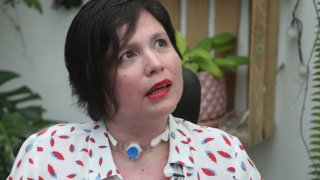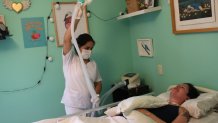
A Peruvian psychologist who suffered from an incurable disease that weakened her muscles and had her confined to her bed for several years, died by euthanasia, her lawyer said Monday, becoming the first person in the country to obtain the right to die with medical assistance.
Ana Estrada fought for years in Peruvian courts for the right to die with dignity, and became a celebrity in the conservative country where euthanasia and assisted suicide are illegal.
Watch NBC6 free wherever you are
>In 2022 Estrada was granted an exception by the nation’s Supreme Court, which upheld a ruling by a lower court that gave Estrada the right to decide when to end her life, and said that those who helped her would not be punished. Estrada became the first person to obtain the right to die with medical assistance in Peru.

Get local news you need to know to start your day with NBC 6's News Headlines newsletter.
>“Ana’s struggle for her right to die with dignity has helped to educate thousands of Peruvians about this right and the importance of defending it,” her lawyer, Josefina Miró Quesada, said in a statement. “Her struggle transcended our nation’s borders.”
Estrada, 47, suffered from polymyositis, a disease that wastes away muscles and has no cure.
She began to present the first symptoms as a teenager and started to use a wheelchair at the age of 20 because she had lost the strength to walk.
Despite these obstacles Estrada obtained a psychology degree and became a therapist. She earned enough money to buy her own apartment and became independent from her parents.
By 2017 however, Estrada’s condition worsened and she could no longer get up from her bed.
She had difficulty breathing and survived pneumonia. And even though she could not type, Estrada used transcription software to produce a blog called “Ana for a death with dignity,” where she discussed her struggles and her decision to seek euthanasia.
“I am no longer free,” she said in an interview with the Associated Press in 2018. “I am not the same person I was before.”
With the help of Peru’s Human Rights Ombudsman, Estrada won a lawsuit that gave her the right to die with euthanasia. From her bed, she participated in court sessions through video conferences.
Estrada told judges in 2022 that she valued life, and did not want to die immediately, but wanted to have the freedom to decide when to end her life.
“I want to accede to euthanasia when I can no longer sustain suffering in life,” she said. “And when I decide to bid farewell to my loved ones in peace and with tranquility.”
Only a handful of countries have legalized euthanasia, including Canada, Belgium and Spain. Some U.S. states including Maine and Oregon allow physician-assisted suicide, where a doctor provides a terminally ill patient with the means to end life.
Euthanasia is illegal in most Latin American countries, except for Colombia, which legalized it in 2015 and Ecuador, which decriminalized the practice in February.



